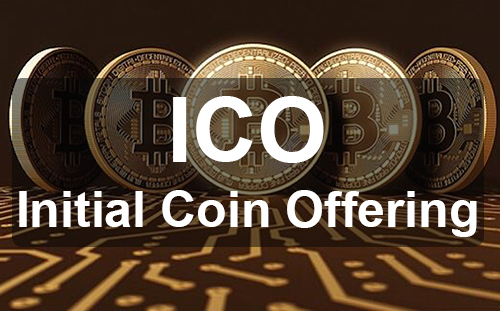Thanks for stopping by to read our complete Initial Coin Offering guide.
You've found out about Initial Public Offerings (IPOs), which is when a business's stock goes public. However today, we have actually something called ICOs– initial coin offerings. An ICO is where a cryptocurrency goes public for the first time. Today, we're describing whatever you have to know about ICOs– and how they might make you rich :)!
Exactly what is an Initial Coin Offering (ICO) ?

An ICO, or Initial Coin Offering, is a new phenomenon that has actually emerged from crowdfunding, cryptocurrency, and blockchain innovations. Also called a “crowdsale”, an ICO is when a business releases its own cryptocurrency with the purpose of financing.
Generally, companies will release a pre-defined number of crypto-tokens (whatever their “unit” of currency might be), then offer those tokens to a designated audience.
During an initial coin offering, companies usually exchange their cryptocurrency for Bitcoins. Nevertheless, some ICOs include the exchange of fiat money as well.
Completion outcome of an ICO resembles completion result of an IPO: the business gets capital it can utilize to continue growing its innovation, while the general public gets access to shares in the company. Now, both parties have an incentive to see the cryptocurrency grow.
History of ICOs: Have There Been Lots of Successful Initial Coin Offering?
ICOs didn't exist until the last several years. The first ICO is generally credited to Mastercoin. Mastercoin's ICO in 2013 raised over $5 million in Bitcoins through the sales of their own Mastercoin tokens.
After the success of Mastercoin, other cryptocurrency business did the same. Ethereum— which is one of the greatest altcoins worldwide today– had its ICO in 2014, and Wave had its ICO in 2016. Ethereum raised $18 million from its Initial Coin Offering, while Wave raised $16 million.
Based on the success of these three ventures, ICOs are being increasingly viewed as an efficient way to kickstart cryptocurrency projects. The general public will back a cryptocurrency with a solid development group, strong technological structure, and transparent business structure.
Exactly what's the Difference Between an IPO and an ICO?
There are some obvious similarities in between IPOs and ICOs– and some crucial distinctions:
You're Not Buying a Share of Ownership During an ICO
During an IPO, a business offers shares that signify a share of ownership because company. This isn't constantly the case with the cryptocurrency industry: throughout an ICO, you're purchasing a system of currency for that project– which isn't technically a share of ownership. It's comparable to a share because it's tied to the value of the company, but it's not an actual share of the company's ownership. This is a crucial difference. Nevertheless, some crypto-tokens are used to move voting powers. When you buy a crypto-token, you get a vote in the business. The bigger your share is, the more voting power you have.
Documents and Government Regulations
There's a massive distinction in documentation between IPOs and ICOs. In the corporate world, IPOs are greatly controlled by the government. It frequently takes months– even years– for companies to gather the needed documentation together for an IPO. By filing for an IPO, the company is accepting severe repercussions in any cases of non-compliance. In the cryptocurrency world, government regulation is essentially non-existent. Any company can launch an Initial Coin Offering at any time with little preparation or documentation.
The lack of documentation and regulation offers the cryptocurrency world another special advantage: only certain people can participate in an IPO. In the cryptocurrency world, however, practically anyone from any nation can participate in ICOs. The lack of policy implies cryptocurrency ICOs include greater opportunities to raise money– however also more dangers. Investors don't constantly know if the company is genuine, and companies do not constantly know if their financiers are legitimate.
What Else Can You Use ICO Crypto-Tokens For?
Most of the times, ICO crypto-tokens are simply a system of currency. Nevertheless, we've seen examples of business taking this in other methods. Storjcoin is one good example. A company called Storj.io released crypto-tokens called Storjcoins during its ICO. Storj.io isn't a cryptocurrency business: it's a cloud storage start-up. When the company launches its final storage platform, users who acquired tokens during the preliminary ICO will be able to spend those tokens on that product.
Ethereum is another simple example: Ethereum is a platform for constructing all types of decentralized apps. Users own tokens called Ethers that permit you to preserve the operation of apps built on the platform.
Ultimately, ICOs are a relatively new thing. We've seen business utilize their tokens to represent all various things– but the future use for the technology is practically endless.
What Are the Benefits of an Initial Coin Offering for Individual Users?
Should you take part in an Initial Coin Offering? Why would specific users gamble on an unidentified company online?
The primary benefit of an Initial Coin Offering is that you are helping a business launch its product in exchange for predicted future value. You're buying into something today in the hopes that it will deserve more in the future. You can exchange the company's tokens in the future after the worth of the tokens rises, for example.
Think of an Initial Coin Offering like Kickstarter. Everybody has their individual factors for funding a job. Some people wish to purchase a cool product for a lower price than its last MSRP, for example, while others have an authentic interest in seeing a business prosper.
Here's the most significant benefit of an Initial Coin Offering, nevertheless: in 2014, Ethereum offered coins through its ICO at a rate ranging from $0.30 to $0.40 per token. The company released its last platform in July 2015. By that point, the cost of each token had actually risen significantly– as much as $19.42 at one point. If you purchased tokens during the Ethereum ICO, you earned a return of over 6000%.
Obviously, Ethereum is an exception– not the guideline. Initial Coin Offering campaigns might fail. You could spend $100 on a business's tokens during an ICO, only to watch the business fizzle and pass away prior to they launch a real item. Just like with any investment, thorough research study is essential.
How Do I Participate in an Initial Coin Offering?
In the early days, Initial Coin Offerings had a typical problem: it was hard to spread the word about an Initial Coin Offering to the public. You needed to draw visitors to your personal site, then convince them about the benefits of your Initial Coin Offering.
Thankfully, a better service has emerged. ICOs Initial Coin Offering have actually been growing in appeal over the last few years. Today, a variety of sites have actually emerged to resolve the need. The main platforms include:
- Waves
- ICONOMI
- State of the Dapps (based upon Ethereum).
- TokenMarket.
These platforms provide companies an easy way to promote their Initial Coin Offerings – just like how Kickstarter and Indiegogo give start-ups an easy way to promote their crowdfunding projects. Today, you can check out any of the sites noted above to find out about Initial Coin Offerings happening – or to participate in an ICO yourself.
What Prevents the Company from Running Away with All of the cash?
Among the nice parts about IPOs is that companies need to file paperwork and regulatory files before their IPO. This secures individual financiers.
In the world of ICO projects and Initial Coin Offering, however, there are little to no guarantees that your loan won't disappear. You're providing loan to a business online– and in a lot of cases, those companies are new start-ups with minimal transparency.
Fortunately, ICO job leaders are well-aware of these viewed security problems. They comprehend investors may be reluctant Initial Coin Offering. That's why trusted ICO jobs will impose restrictions on themselves to offer much better trust and transparency to factors.
Some popular restrictions and guidelines in the Initial Coin Offering world include:
Keeping the contributions of members in an escrow wallet; in order to access the funds stored in the escrow wallet, the owners require private secrets. Among those personal keys is owned by a trusted 3rd party without any involvement in the task development. In other words, the funds of investors are protected by a neutral 3rd party in Initial Coin Offering.
Companies may establish a legal structure between themselves and contributors, including a set of terms and conditions for the Initial Coin Offering.
Business will provide a great deal of openness, in regards to their place, members, creators, executives, company strategy, roadmap, etc in Initial Coin Offering.
Ultimately, Initial Coin Offerings differ widely in regards to their trustworthiness, reputability, and future success. It's up to specific financiers to find Initial Coin Offering scams and secure their investments.
How Do You Spot an Initial Coin Offering Scam?
Like any market, there's the potential for frauds in the world of Initial Coin Offerings. There's no foolproof method to discover frauds 100% of the time. Nevertheless, there are specific red flags you can expect, including:.
Anonymous Developers: Honest companies are transparent about their executives and workers in Initial Coin Offering.
Lack of an Escrow Wallet: Is the money from the Initial Coin Offering going straight to the designers? What avoids them from running away with the money after it's all raised? An escrow wallet gives financiers an additional level of protection.
Unclear or Unrealistic Goals: “We wish to be the next Bitcoin” is not an impractical company plan or technique for an Initial Coin Offering. “By April 2018 we prepare to openly introduce our blockchain platform” is much better. Make sure your picked Initial Coin Offering is backed by realistic, clear objectives.
Lack of Transparency: Is there get in touch with info attached to the Initial Coin Offering? Do you understand the address of the business? Is there any signs of operate in development? Exists a working blockchain develop? Has the business released snippets of their code? Is there any proof of genuine work happening behind the scenes? the more transparency in an Initial Coin Offering there is, the better off you'll be.
By following the above guidelines, you can prevent Initial Coin Offering frauds while still contributing to ICOs that have the best possible chance of success.
Follow Us on Social Media Below (We are a Real People :)):
Subscribe To Our YouTube Channel Here
Thanks,




Leave a Reply